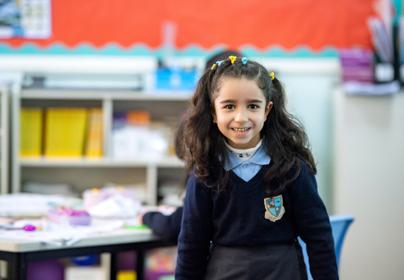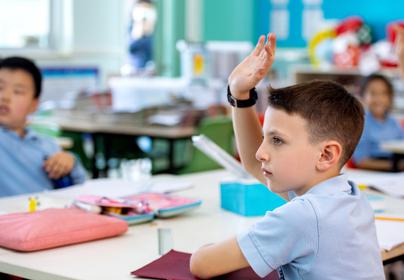Music education is vital for Early Years Foundation Stage (EYFS) students, supporting their overall development. At this age, children are highly receptive to auditory stimuli, making music an effective tool for enhancing cognitive, emotional, and physical growth. Rhythmic development is key, as following a beat improves coordination, timing, and motor skills essential for speaking, reading, and writing. Rhythmic activities also teach self-regulation and listening skills, fostering concentration and patience. Recognising sound patterns is another important element, helping children develop pre-math skills like sequencing and predicting outcomes. This exposure strengthens their ability to discern pitch, tone, and volume, critical for language development, and enhances their memory and auditory discrimination skills.
At Britannica International School, our EYFS music program ignites curiosity and creativity by immersing students in music's core elements. We focus on rhythmic awareness while introducing harmony, melody, and pitch through engaging, hands-on experiences. By encouraging direct interaction with instruments, we allow students to explore sound, experiment with beats, and understand how each instrument works.
This tactile approach not only builds confidence but also deepens their appreciation of music's structure, laying a strong foundation for future learning. Our goal is to inspire a lifelong passion for music and the arts, nurturing their innate love for music as they grow into confident, expressive individuals.
Pre-Nursery has been immersed in the story of Owl Babies while exploring the theme of families. They’ve had a wonderful time in the garden, collecting leaves and sticks to craft their own owls. This week, the number three has taken centre stage, with the children counting to three, identifying three objects, and recognising the number in their surroundings
Nursery have been very happy to be back n school this week and have enjoyed sharing all their stories form the holiday. This week they have focused on numbers up to 10, and the children have demonstrated impressive counting skills. The children also revisited basic shapes, and everyone had fun identifying circles, squares, and triangles in our surroundings.
Reception continued the story of Baby Owls, which sparked the children's interest in bird nests. They explored various types of nests and gathered twigs and leaves to collaboratively build their own. In Maths, the focus was on 2D shapes, introducing their names and properties, such as sides and corners. The children practiced their cutting skills to create their own shape monsters from the shapes they cut out.




